Writing Advice:
Author Maggie Richell-Davies shares her journey from being rejected by agents, to learning the value of a good critique, to winning a book competition, to becoming a published novelist
Quick links on this page:
Maggie and I have never met in person, but we have liaised with one-another for many years. She's entered my To Hull And Back short story competition, I've listed writing competitions run by Ninevoices – her writing group – and they have very kindly publicised the writing competitions and challenges I run on my site.
Here is a link to the first instance of this, when Maggie shared the adverb writing challenge with her group way back in 2016, just after its launch.
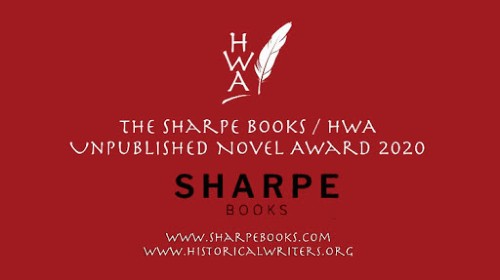
More recently, Maggie contacted me and asked if I'd be interested in her writing a guest post / case study about her journey from starting out in fiction writing through to her debut novel winning the Sharpe Books / Historical Writers' Association 2020 Unpublished Novel Award, which gained her a generous cash prize and a publishing contract.
I thought it sounded like an interesting idea, so I said, "Yes please."
In her post, Maggie is very open about the challenges she faced, including receiving multiple rejections from literary agents while she tried to pursue a traditional route into print. In the end, she found another way to see her book published, which involved a lot of hard work and dedication.
I hope you find her story inspiring. It shows that if you ignore the Demon of Doubt, keep trying and never give up, you can find success. As always, your comments are welcome and can be submitted at the bottom of Maggie's post.

Rejection can be tough, especially when the Demon of Doubt, about whom Chris writes so feelingly, emerges from his sulphurous pit to torment you. But do professional athletes give up if they don’t win that gold medal? Don’t they simply push themselves harder?
During years of submitting my work, I’d had short stories longlisted and shortlisted plus, more recently, encouraging feedback from agents about my debut novel, The Servant, a historical thriller about a 15-year-old servant sent to work for a disgraced aristocrat who finds herself in terrible danger.
But no offers to publish.
I needed to know why, but agents are inundated with submissions and – understandably – can’t spare the time to give you much in the way of feedback. Instead, frustratingly, typical responses were:
"Thank you for sending the ms – there is an awful lot I like about it, especially the progress and depth of the relationship between Hannah and Thomas which is so powerful and humbling for the reader. However, the market is so tough currently that I do have to be completely bowled over. I’m sorry it’s been a near miss." (Caroline Sheldon Literary Agency)
"I can see why you’d have interest. This is terrific. But not one for me, so I’ll bow out. I’m sure you’ll do well with it." (Jo Unwin Literary Agency)
"I’m not able to give feedback, as what little advice I could give might make you change things another agent might like." (The Bent Agency)
"Debut historical fiction is usually very hard to sell – it needs to be exceptional to stand a chance in today’s market. I think you might have the potential to succeed – but not perhaps with this story. I’d be very pleased to consider a sample of your next novel, should you not find representation this time round." (Ampersand Literary Agency)
So near, but yet so impossibly far. I could hear the wretched Demon chortling to himself.
Then I managed to book a one-to-one with an agent at last summer’s Hastings Literary Festival.
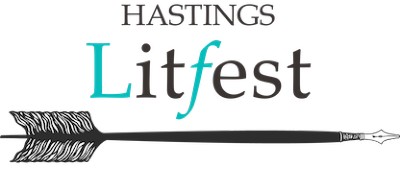
Eyeball-to-eyeball, she admitted the work was too dark for her. Historically accurate, but unpalatable. I fought my corner about wanting to represent eighteenth century London as the brutal and squalid place it often was, and she agreed to look at the manuscript again.
Before heading for the station, I even celebrated what looked like a second chance at acceptance by scarfing down a bag of chips on the promenade. Yet, in the fullness of time, the lady failed to even acknowledge my resubmitted manuscript.
Oh, how the Demon must have laughed.
But I wasn’t ready to give up. I was in this for the long haul. I needed a beady eye on my writing to tell me how to make it unputdownable, despite those sinister bits. But where to find one?

A good writing group like my own, Ninevoices, will provide constructive criticism, but members can be as protective of one another’s work as they are of their own. Their eyes aren’t always beady enough.
There are professional manuscript assessment services out there, but you can pay from £100 for a detailed critique of your opening 3,000-words/1,000-word synopsis, to over £2,500 for twelve month’s mentoring of 60,000-words, plus extra fees for each additional 1,000-words. For a typical novel pushing 100,000-words, that can add up.
In addition, there are courses linked to literary agents. Curtis Brown Creative, for example, offer a range led by published authors both online and in their offices. At just under £3,000 for a six-month novel-writing course, the cost is not dissimilar to a University course like those run by the University of East Anglia.
However, if you don’t have that kind of spare cash lying around, increasing numbers of novel and book competitions provide a critique for an affordable additional fee.
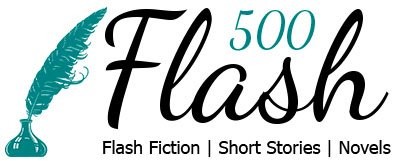
This, I decided, was my way forward and I invested £35 in an entry-plus-critique in the Flash 500 Novel Opening Chapter & Synopsis Competition. And although I didn’t win a prize, I received an invaluable confidence boost from Lorraine Mace, who is the current Writer’s Forum competition judge.
Lorraine’s report began by apologising for having ‘very little to offer in the way of criticism, but quite a lot in the way of praise!’ (her exclamation mark). As can be seen in the following extract, she then examined how I’d fared with key elements of my submission:
Presentation: The layout is good.
Title: The title is apt for the story and nicely evocative of the era.
Opening: I really like the opening to this. It introduces the central character and one who will obviously make her life a misery. You have a very nice turn of phrase and I found all three characters compelling in the opening chapters.
Dialogue: Your dialogue is natural sounding, helps to drive the story along and also aids characterisation.
Characterisation: The characters are well drawn and credible.
Settings: Good – it was easy to picture the various settings.
This report told me there was nothing badly wrong with my writing and, better still, that the book had appealed to Lorraine. An illustration, in the light of the judges’ decision to award their prizes elsewhere, that – unsurprisingly – different people like different writing styles. Life would be boring if they didn’t.
So, with a rude gesture in the direction of the Demon, and knowing I needed to up my game, I stuck Lorraine’s comment from her accompanying email – "If I’d picked this up in a bookshop, I’d have taken it straight to the till" – on a post-it note above my computer and hunted out more competitions offering feedback.
I then struck lucky with the Blue Pencil Agency. Again, my entry to their BPA First Novel Award 2019 was unplaced, but they subsequently offered a £50 discounted short editorial report to those whose manuscripts showed potential. A bargain, as the service normally costs £400.

Incredibly, their ‘short’ editorial report turned out to be a detailed and thoughtful nine-page analysis of my opening 5,000 words. Not only were weaknesses pointed out, but insightful solutions were suggested. That their reader’s advice was game-changing can be seen from the following extract.
Structure:
I enjoy the opening scene in which Hannah is essentially being sold to Mrs Chalke. It sets up the divide between the mistresses and Hannah very well. I also liked how Hannah is so passive that she is almost absent from the scene, which is very effective. However, the chronological narrative does complicate the structure. Although this is logical for a present tense narrative, it does mean that we miss out on Hannah’s life prior to her going to the Chalkes. I would consider implementing a few flashback scenes. As something to consider, a prologue containing a flashback to Hannah in the poorhouse when someone tried to take away her mother’s dress would be effective. We would see that her mother had died, she was being forced into a lower class of society and that her surroundings were unpleasant. If we were then to read the scene with Mrs Chalke we would have greater contextual knowledge to understand what is going on and feel sympathy for Hannah.
I would also pay attention to the narrative gap at the beginning of chapter two. This begins with Hannah stepping into the kitchen of her new home. Here there is the potential to create tension by describing her arrival at the house, her fears as she approaches, and what the house looked like. I want to visualise the house, and at present, I can’t.
Characterisation:
Mrs Lamb. I think Mrs Lamb is a great character. That she fulfils the role of Hannah’s absent mother is a nice touch. However, I thought that you could make this dynamic more explicit…by showing this to us in their interactions.
Detailed analysis like this is worth its weight in gold and I immediately introduced a flashback about Hannah’s earlier life to my first page. I also re-wrote the opening of Chapter Two to highlight Hannah’s interaction with Mrs Lamb – and to have my reader looking over the women’s shoulders as they approached a house which would turn out to be heaving with sinister secrets. Elementary showing-not-telling that I should not have needed reminding about. Stand in the dunce’s corner, foolish woman.
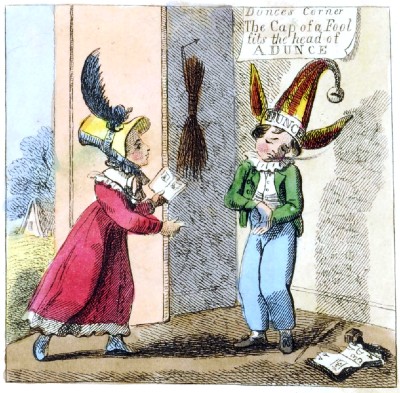
If you read what follows, I’m sure you’ll agree that following that excellent BPA advice made a huge difference.
Here is my original version:
I step into the kitchen of my new home, flustered and with my nostrils twitching. The place stinks of old meals and rancid fat. Dirty dishes overflow the stone sink. The fire is a bare glimmer.
Mistress Chalke looms over me. Skirts lifted clear of the floor and her mouth turned down. Its preferred position, I have decided.
~
Here is my revised/fleshed-out version:
Mrs Lamb frowns up from the written directions in her hand to the tall, narrow house at our journey’s end.
‘What was Mistress Buttermere thinking? Sending you here.’
Set behind spiked railings, little more than a yard from the public street, it is not somewhere you would expect a gentleman to live. The green-painted front door is chipped and flaking. The windows are grimy, with heavy curtains drawn tight across all those at ground level despite the sunny morning. Soapy water thrown over the steps has not been swept away, puddling dirty suds under our feet.
‘Your new master may have fallen on hard times, but I did not expect this.’ My arm is tucked in hers and she squeezes it. ‘But it is only for a year, Hannah. By then we could be back in London. I can’t see Mistress Buttermere wanting to move under her son-in-law’s roof. Being a widow all these years, she has lost the habit of doing any man’s bidding.’
She gives me a quick hug before leading me down the steps to the servants’ entrance and rapping at a tarnished knocker.
‘Perhaps there’s a magic carpet inside,’ I murmur, ‘and I’ll climb onto it and fly over the sea and far away.’
‘The only carpets I suspect you will find in there will be ones in need of vigorous beating.’
My elbow is squeezed again as a rattle of bolts announces the opening of the door.
‘Mistress Chalke…’ Mrs Lamb starts in surprise at its being answered by the lady of the house.
The face is not welcoming.
‘You have brought the girl.’ Her hand grips my wrist and I catch a last glimpse of Mrs Lamb’s startled eyes as I am jerked inside and the door is slammed behind me.
Then I am in the kitchen of my new home, flustered and with my nostrils twitching. The place stinks of old meals and rancid fat. Dirty dishes overflow the stone sink. The fire is a bare glimmer.
I am released and Mistress Chalke looms over me. Skirts lifted clear of the floor and her mouth turned down. Its preferred position, I have decided.
~
A world better, don’t you agree?
I had found the beady eye I needed and my book was stronger for it.

Organisations such as the Romantic Novelists’ Association also offer affordable advice and, after Christmas, I took advantage of their New Writers Scheme where – along with the £65 membership subscription – one of their published authors will provide a critique to the first 300 applicants who have not had a full-length novel or serial published.
My book was a thriller rather than a conventional love story but, because it covered a dark subject, there was a compensating love element which allowed it to qualify. You might be surprised, incidentally, to learn that the RNA includes male authors in its membership.
The extremely comprehensive report that I received from the RNA saved my bacon, since my reader pointed out (gently) that a minor character had miraculously reappeared after being killed off half-way through the story.
In addition, she advised me that an important plot element involving an inheritance would have required an Act of Parliament to have taken place. She also suggested that, since I had given the story a happy conclusion, I should develop that more fully.
More invaluable advice to take on board.
So when, last winter, I read about the HWA / Sharpe Books Unpublished Novel Award, I not only felt ready, but realised that these were the right people to care about women with darned stockings and blisters on their thumbs. Moreover, the prize was not only a cheque for £500, but a publishing deal with Sharpe Books.
To cut a tortuous story short, The Servant won the competition and is currently garnering four and five star reviews on Amazon. And that dastardly Demon of Doubt has at last been kicked into oblivion, where he belongs.
Small publishers have neither the resources nor the staff of the big guys which, added to the difficulties presented by the corona virus, meant I had to set aside new writing projects in order to promote The Servant myself. Sharpe Books have, however, provided an advice sheet on how to be proactive, largely on social media. (I could show you a copy, but then I might have to kill you.) Among other things, they advocate a daily presence on Twitter and Facebook, plus regular mentions on Goodreads.
I actually find this process enjoyable, already having a healthy Twitter following of over three thousand followers. Being shameless, I even managed to persuade the guy delivering cement for our neighbours’ new extension to pose for a Tweet picture holding my book. It is, after all, a thriller, not chick lit.
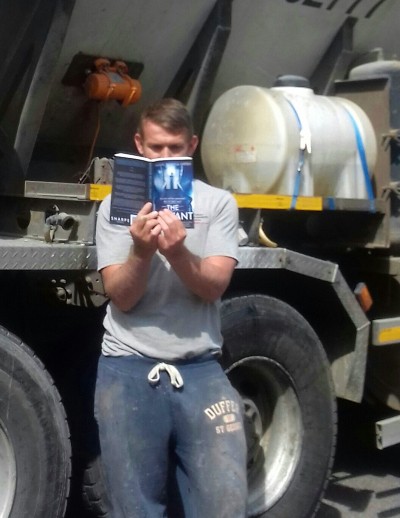
Sharpe Books additionally suggest approaching a couple of book reviewers a week – while being wary of those who will expect to be paid in return for a positive mention.
They have themselves set me up with a guest spot on The Coffee Pot Book Club run by Mary Anne Yarde. She gets over a million views, so I’ll be interested to see what response this brings.
All of this is invaluable, since a self-inflicted haircut/hair-colouring session has turned me into a cross between Henry V and Richard III which would do few favours at a live book signing.
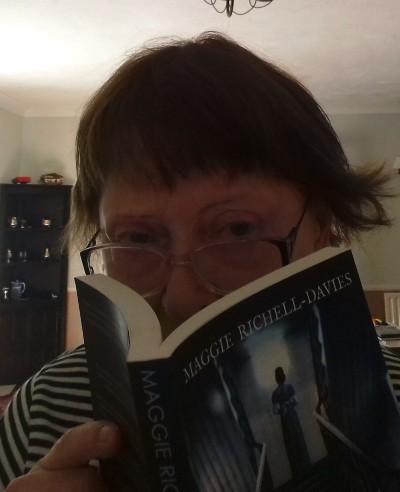
Perhaps the most helpful things I have done off my own bat is to acquire a professional-looking website. I could have gone with Wordpress – which Ninevoices use – but was delighted to discover that a bespoke site could cost little more than a service on my Polo.
Nick James of MTL has proved the safest pair of hands and done all the behind the scenes techie stuff (like securing domains), involving me only with key decisions. There are a lot of generic websites out there, but MTL aims to produce something unique to their client – something that represents her/his/their values and personality. There have been no nasty surprises and I always know what is going to happen next, and how much it will cost. Nick certainly knows what he is doing, so why not take a look at what he’s done for me?
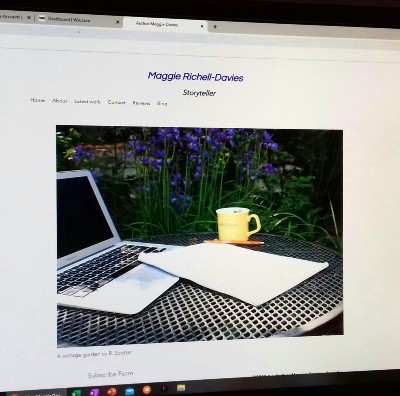
To begin with, when approaching reviewers, I was sending stacks of information to try and persuade them to choose my book from among the many on offer. Now, I send the following:
Hi, Julie, (Always use their name – why should they review your book if you don’t treat them with courtesy?)
Seeing that you like historical novels, I’m hoping to tempt you into eighteenth-century London with my debut novel, The Servant, which won the HWA/Sharpe Books Unpublished Novel Award this spring.
My heroine is a fifteen-year-old servant who finds herself in danger after being sent to work for a disgraced aristocrat.
I’d be thrilled if you wanted to review it. Full details about it – and me – are on my website.
It has already brought positive responses and I am currently awaiting reviews from a dozen well-thought-of reviewers. The first review quoted on the site is one from Houston, Texas. And the US is a potentially huge book market.
Be persistent with writing and submitting your work. Treat this like training exercises.
Take advice from writing groups, offered critiques and from websites like the one Chris provides. A touch of humour really helps you bounce back from rejection.
Target competitions likely to go for your particular style of writing
And if that Demon appears – which he will – apply your foot firmly to his nether regions.

To quote my publisher: "Always think about the writing process as more of a marathon than a sprint."
2019 was the inaugural year of the HWA/Sharpe Books Unpublished Novel Award competition. It should be running again this autumn so, if you write historical novels, put this in your diaries.
Last year the publisher, Richard Foreman, offered free telephone advice on publishing to ALL entrants (was the man mad?) and might well do the same again this year.
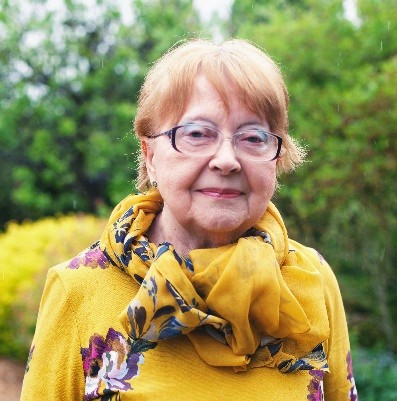
Maggie was born in Newcastle and has a first class honours degree from the Open University.
Her debut novel, The Servant, won the HWA/Sharpe Books 2020 Unpublished Novel Award this spring and is currently available on Amazon. She has previously been shortlisted for Bridport Flash and the Olga Sinclair Award, and longlisted for the Exeter Novel Award. She is a member of the HWA and the RNA.
She lives in Royal Tunbridge Wells with her husband, but also spent a number of years in Peru, Africa and the United States.
You can find Maggie:
I'd like to thank Maggie for sharing her journey with us. I found her determination and resilience inspiring to read about. It just goes to show, if you keep trying and refuse to give up, you can (and often will) find success. It just might be somewhere unexpected.
If you have some writing experiences you'd like to share with my readers, please review my submissions guidelines and then contact me.
David S
Thanks, Maggie. The above is so encouraging. Servant, fetch me my inkpot and quill. I've got ye old mojo back.
Chris Fielden
Glad to hear it, David :-)
Maggie R-D
David - so pleased to hear you have your mojo back. I considered giving up on countless occasions, until I realised that the most important thing to me was the writing, rather than any acceptance I received for it.
I have a friend who paints water colours. She gave up trying to get anything accepted for the Summer Exhibition years ago. What she paints is pleasing enough to hang on her own walls and be used for birthday cards for family and friends. Most importantly, she gets enormous satisfaction out of the creative process.
So keep writing, just for the hell of it. And to spite that old Demon of Doubt. And, with the pressure off, you might find you start winning things.
Best of luck! Maggie
Alan D
Many thanks for this, Chris and Maggie – full of useful and interesting material, as always!
John N
Hi Maggie, I must congratulate you on your perseverance and what resulted from it. I am now looking forward to reading 'The Servant'. I have never attempted to publish a novel myself, although I have a thick stack of papers written years ago which were destined not to become one. Give my love to Tunbridge Wells from a former resident of Hadlow. John
Patricia B
Dear Maggie, thank you so much for your insights. How encouraging to someone like me who has had positive feedback from various sources but no progress beyond that. Two novels in, I am at an impasse and your helpful, spirited article has told me to persist.
I wish you all the best with The Servant which I will be ordering forthwith.
Best wishes, Patricia
Chris Fielden
Thank you, Alan, John and Patricia - great to hear you all enjoyed the post. And thank you for supporting Maggie and buying her book. That is awesome :-)
Maggie R-D
Alan - I'm chuffed that you found it both interesting and useful. Chris's site always reminds me of one of those Parisian cake shops, stuffed with so many goodies that you don't know what to choose. Hope my piece has encouraged you to sink your teeth into one of the many competitions he is offering up. Maggie
John - Wonderful that you are tempted to buy The Servant. It's a dark read, but very much research-based. The lower classes had a hard time of it back in the eighteenth century.
You really ought to re-visit those papers of yours - there is probably some good stuff there that could be polished and sent out. Maybe you could come up with a ghost story about that atmospheric tower just off Hadlow High Street... Maggie
Patricia - one of my favourite quotes is from Sylvia Plath: "I love my rejections. They remind me that I'm trying."
You must keep going. The difference between being turned down and accepted can be paper thin. Often one just needs some disciplined tweaking.
Best of luck. Maggie
Andrew C
Well done, Maggie, on your success. It's lovely to read a story where persistence brings a win. It was good to be reminded that often getting published requires an outside pair of expert eyes to reveal the weaknesses of your work. The question then becomes how much are you willing to spend / able to afford and where do you spend that money. Thanks for sharing, Chris.
Malcolm R
Wonderful story of determination, well done Maggie.
Chris Fielden
Thanks Andrew and Malcolm :)
Maggie R-D
Andrew - Glad you enjoyed my piece. I'd been worrying that I wittered on too much and Chris was too kind to wield his red pen!
Persistence is all-important, but an outside eye is probably what makes the crucial difference. Writing groups are a godsend, if you can find the right one locally - or, if you can't, find one on-line to follow. My own group (ninevoices.wordpress.com) puts up regular thoughts about writers and writing. And there will be others. Professional advice, as you say, can cost you, but increasing numbers of competitions offer advice for those who get onto their longlists or shortlists. Writers' Forum are also a cost-effective source - though they have currently shut up shop because of the pandemic. Keep your eyes peeled. Maybe Chris could do a feature on them...
Best, Maggie
Malcolm - thank you for you congratulations - I was practically doing cartwheels around my kitchen when I heard I'd won. Not a pretty sight, I assure you. As you say, determination / persistence is what so many things in life are about, not least writing.
Regards, Maggie
Lynn L
Thanks Maggie, this is amazing. To read all you've gone through and to see you emerge successful is so inspiring.
You were so close for so long and many would have either given up or assumed they didn't need to do more to improve their work. But you kept going, actively seeking critique upon critique and that's what's helped you win out.
I wish you all success and will definitely be searching out The Servant. (Personally, the'dark' element really appeals to me and historical mystery too? Count me in!)
Maggie R-D
As I mentioned in my piece, Lynn, it was suggested I tone down my 'dark bits', and not just by that agent at the Hastings Lit-Fest event. However, I decided the way forward was to make sure I interspersed the bleak passages with gleams and glints of hope - together with a cliff-hanger of a love story.
Apparently the tactic worked. Life gets bleak sometimes - as it is at present - but reading is a useful escape. And one can learn things from the past to apply to the present. I hope you like the book - do let me know...
Charmian
S
Thank you, Maggie, for the very generous sharing of so much helpful information, and the insights into your path to publication.
Also, thank you, Chris, for your books, website and support for writers.
Chris Fielden
No problem, thank you Charmain :-)
Maggie R-D
So pleased you found the piece helpful, Charmian. And delighted to see some plaudits from you for Christopher's site. It is one of the wonders of the writing world. I still remember - back in the mists of time - sending him a short story. It didn't win. It didn't get shortlisted. It didn't even get longlisted. BUT Chris tailed it onto his 'Commended' list. It felt like winning the lottery, and gave me the encouragement to keep going.
Jean CM
Dear Maggie, I am a fan of the Christopher Fielden website and visit often but for some reason I didn't see this. Shame on me! It was pointed out to me by my friend Cheryl, who loved the account as much as I did, and was as inspired by your story. It's a lonely road to such a goal and we all sympathise with each other and give as much help as we're able. But in the end, it's the professional view that makes the decisions and I'm so thrilled your book has won through to publication.
Chris Fielden
Thanks Jean :) If you'd like to receive notifications about new posts on my site so you don't miss them in future, please consider signing up to my email list. You can learn more and sign up here.
Dianne BW
Thanks for this Maggie and Chris. REALLY helpful and motivating. One of the biggest challenges writers face is not giving up yet it can be hard when, as this post demonstrates, you don't quite know where you're going wrong. Some excellent tips here for obtaining feedback.
Good luck with the book and any that follow.
(By the way, Writers Forum is now up and running again.)
Chris Fielden
Thanks, Dianne, glad to hear you found Maggie's post helpful. And thanks for the WF update too - much appreciated :-)
Maggie R-D
My thanks to Jean and to Dianne for taking the trouble to comment on my piece - it is really appreciated. And for the welcome news that Writers' Forum is up and running again. We writers need all the help and encouragement we can get, and I always find it heartening to discover how supportive the writing community is to its fellows. Maybe we should shoulder aside the politicians and take over?
Leave your comments
Please use the form below to leave your comments. All comments will be reviewed so won't appear on the page instantly. I will not share your details with anyone else. Most recent comments appear at the bottom of the page, oldest at the top.